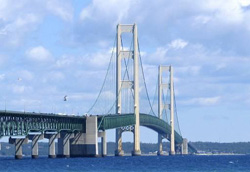
How do you pronounce ‘Mackinac’?
Terroir is a word suddenly popular in English, at least among foodies.
From French, it’s a shortening of goût de terroir: “taste of the earth.” (The same Latin word in terroir shows up in English territory.) It’s the thing that enables oenophiles to detect which hillside produced the grapes in their burgundy or the flavor that distinguishes Michigan sweet cherries from ones from Washington.
Nothing is so important to our linguistic terroir than knowing how to say the names of Michigan places like Ypsilanti, Milan, and Saline. Michiganders know each other by their ability to say “Mackinac Island” without a k sound at the end or mention Schoenherr Road in Shelby Township without even thinking about it.
Two books tell us a lot about the terroir of Michigan place names from Native American sources: Virgil J. Vogel’s Indian Names in Michigan and William Bright’s Native American Placenames of the United States. These are remarkable books showing deep scholarship and collaboration with wise Native Americans.
Michigan, as most people know, is named for the Lake, probably deriving from an Old Ojibwa name meshi-gami, itself the ancestor of modern Ojibwa michaa- “be big,” and gami- “lake.” The name of the beautiful, but far smaller, lake in Marquette County, Michigamme, comes from the same source.
Some of our place names come from the names of famous people like Pontiac, the 18-century leader who attempted to drive out the European settlers. When the English got through with him, they named the place (and the former automobile) for him, but they couldn’t get their tongues around his Ottawa name: Bwandiag (sometimes given as Obwandiyag). Topinabee (in Cheboygan County) didn’t get quite so mangled, partly because he came later when more people were bilingual. Other spellings of this chief’s name were Topenebee and Thupenebu. Petoskey from a 19-century person got the reduced spelling from Petosegay.
Native Americans didn’t give names the way we do and make them permanent by signs at the city limits or at the post office, so names could change without upsetting anyone. Saginaw comes from the Sauk people living at the mouth of the Saginaw River (just north of Bay City). When the Sauks left, their name survived. Gogebic in northwestern Michigan probably derives from aazhibik: “rock cliff.” Bois Blanc island in northern Lake Huron looks like the French for “white wood” or a birch tree, but the Ojibwa name was wiigog: “basswood tree.” It all depends on which tree you notice.
Then there are some names that are simply bogus. Henry Rowe Schoolcraft (1792-1864) created the name of Arenac county by combining the Latin word for “sand” with –ac which struck him as “Indian” (as in Mackinac). He also made up some “Indian” tales, and the characters in them were used for Iosco and Leelanau counties. But however bogus they may be they are still a part of our terroir.



Eric Sponberg - BSE 1971
Great article. I graduated from Ypsilanti High School in 1967 and moved right onto UofM to get my degree in naval architecture. My wife and I are part-time ghost tour guides in St. Augustine, FL, in addition to our full-time professions. When we begin our tours in the evening, we always ask where people are from, and we try to offer some personal connection we may have with their hometowns. When someone from Michigan is on the tour, I frequently say, “Oh, I graduated from Ypsilanti High School, and you know that’s true because I pronounced ‘Ypsilanti’ correctly.” That is sure to bring a smile.
I also tell them that I was born in Lansing, but raised in Marquette, so I am both a Yooper and a Troll. Another smile.
Thanks for the article.
Eric Sponberg
Reply
john woodford
Mighty interesting. Corrected my uninformed and unexamined notion of Petoskey and Gogebic being Slavic in etymology.
The expose of Schoolcraft makes me wonder how many other phony Indian place names there may be.
Reply
Elizabeth Lowe - LS&A 1975
Only the locals properly pronounce the name of my hometown Tecumseh. We say “tee-CUM-see,” not “tah-CUM-sah.” It’s located about 30 miles outside Ann Arbor in Lenawee (“LEN-ah-way,” not “len-ah-WEE”) County. I’m amused whenever anyone atempts to correct me.
Reply
janet mendler - M.A.,1973
I am not now, nor have I ever been a Michigoose. Please add Michiganian to the lexicon of proper terms.
Reply
janet Perkins - 63
Media people in lower Michigan pronouce Ontanogon and Baraga wrong. The former they pronounce as On-TAHN-a gone instead of On-tah-NAH-gon They pronounce Baraga as Bah-RAH-gah instead of BEAR-rah-gah. Both are Native American names. Oh, and I’m from Escanaba which in Ojibwa means land of the red deer.
Janet Perkins
Reply
Michael Thomas - 1994
Why is it that Michiganders can’t pronounce words right. Charlotte, NC (Charlette), Tecumseh (Tih-kum sih) the indian name. How many more words are going to be mispronounced. Did Michiganders flunk english?
Reply